Buying guide Ford Capri 280 Mk3
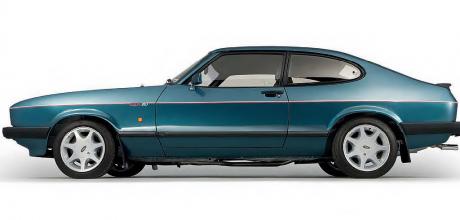
Ford’s final, limited-edition 280 became a collectible classic as soon as it was announced. 37 years on, here’s what you need to know if you’re thinking of buying one.
Words Christian Tilbury
Photos Magic Car Pics
BUYERS GUIDE: Ford Capri 280
What you need to know when buying the final Mk3 Capri.
Come the mid 1980s and the ageing Capri was no longer ‘the car you always promised yourself’, but there were still many that shed a nostalgic tear at the announcement of the iconic coupé’s imminent passing in 1986. Thankfully, they were able to dry their eyes and take solace in that Ford UK rightfully recognised that the model deserved a final swansong in homage to its 30-year influence on the nation’s drivers. The 280 final edition was the welcome outcome. Available only in the UK, the 280 was based on the flagship 2.8 Injection Special. While it was mechanically identical, featuring the same tried-and-tested 2792cc, 160 bhp Cologne V6, Type-9 five-speed gearbox, and the all-important limited-slip differential, there were significant changes to the exterior and interior.
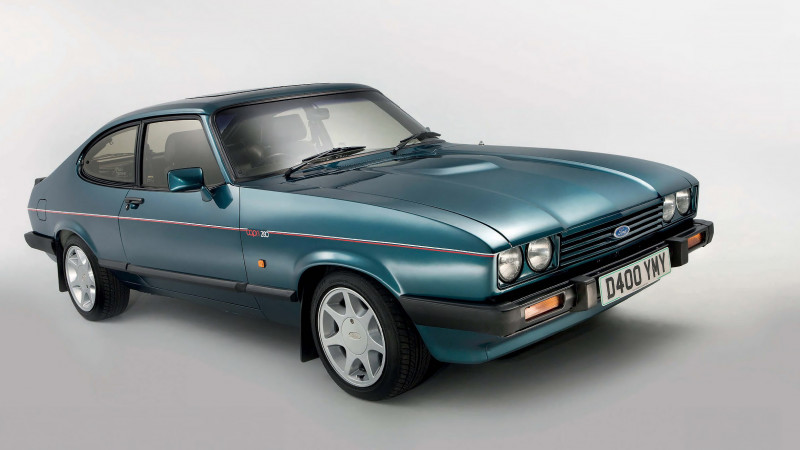
Ensuring that the Capri would literally go out in style, and giving rise to how it more commonly become known, the 280 was solely available in Brooklands Green paint. The classy shade also extended to the door mirrors, grille and headlamp surrounds, with exclusive red and white striping breaking up the Capri’s flanks. Larger 7x15 inch seven-spoke alloy wheels wrapped in 50-profile Pirelli P7F rubber completed the 280’s distinctive appearance. Inside, there was the addition of full Raven leather upholstery with burgundy piping. The steering wheel and gearknob were also leather, while standard equipment included Recaro front seats, steel sunroof, tinted glass and a four-speaker stereo system with the three waveband ESRT 32PS tape deck.
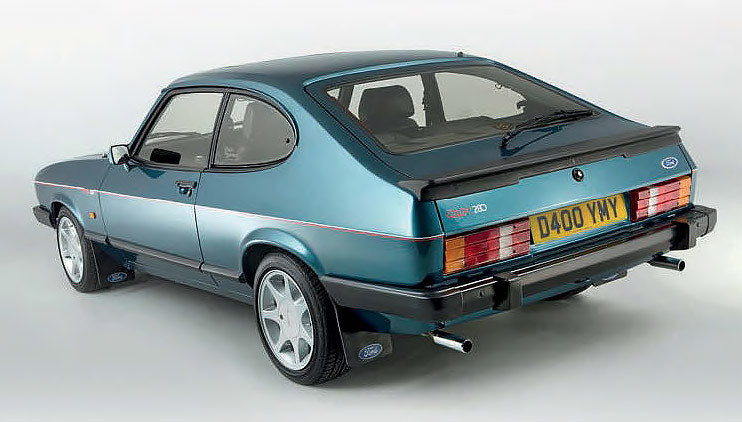
A limited production run of 500, all with gold wheels, was originally forecast, but the 280 obviously hit the mark as orders came thick and fast. Eventually, 1038 examples were manufactured. Of those, circa 400 are thought to remain and survivors are increasingly sought after. However, with the RS3100, burly 3.0S and original 2.8 injection to consider, it’s arguable whether Ford did indeed save the best Capri until last, but there’s no denying that the final 280 has certainly left a lasting impression on classic Ford fans.
INTERIOR
The grey Raven leather wasn’t the most durable even when new. It’s prone to creasing and, worst still, the seats, together with the doorcards, are near impossible to replace. Decent second-hand trim gets rarer every year and the only real viable way to save a trashed interior is a professional retrim. Steering wheels occasionally appear though, with £100-£150 the going price for something that’s tidy. Dashboard cracks are commonplace, with most stemming from the centre speaker vent. Sagging parcel shelves can be costly to replace, although reproduction items can be bought for circa £140.
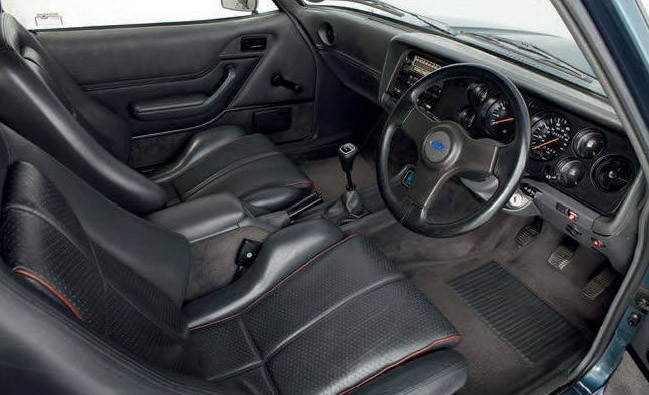
ELECTRICS
The 280 suffers from the usual Capri Mk3 electrical issues – corrosion in the fusebox, dodgy rear wash wipers (usually sorted by cleaning the connections), and blown heater motors. Cleaning contacts and connections usually resolves the first two, while a new resistor tends to bring most heaters back to life. As well as rusty contacts, damage to the earth strip below the rear light clusters can also send the electrics haywire. If the original ESRT 32PS tape deck is missing, second-hand items do surface occasionally, costing in the region of £150-£200.
BODY
Of all the Mk3 Capri variants, the 280 tends to rot the worst, thanks to the combination of poor factory rustproofing and thin paint. Many examples will have already been restored, but check for the known Mk3 rot spots, such as the sills – especially where the sunroof drains – floor, around the rear spring hangers, bulkhead, A-posts, inner wings and strut tops. Other areas prone to corrosion are the wings, lower rear quarters, scuttle, front panel and the tailgate, including its hinges. A plethora of remanufactured repair sections and panels are available, but it’s still difficult to replace bonnets. Damaged bumpers, overriders, decals and alloys can all be replaced with reproduction items.

TRANSMISSION
The 280’s gearbox is the toughest variation of the Type 9 and benefits from an uprated layshaft bearing compared to that in pre-’86 applications, but listen for any rumbling that signals terminal wear. A rebuild kit can be bought for under £200 should it need refurbishing. A slightly notchy gearshift is nothing to be worried about, but any selection issues are usually a result of a tired linkage or, in rarer cases, the result of water entering the ‘box where it butts up to the bellhousing. Look for leaks from the differential casing, as it’s not unusual for the cover to rust, and listen for any whining. However, any rear end transmission noise is most likely to emit from the halfshafts. Ensure the all-important LSD is in place by jacking up the Capri and seeing if both rear wheels rotate when you manually turn one.
SUSPENSION
Replacing snapped or sagging springs, together with tired, leaking dampers isn’t an issue. Correct OE-specification front and rear springs are readily available, while Burton Power offers a pair of rear Bilstein dampers at circa £300 per pair. Noisy front struts can also be revived with a matching Bilstein insert from the same source, costing around £180 apiece. Power steering gives few issues, although complete racks are available on an exchange basis. Vague steering is usually a symptom of worn track control arm bushes.
BRAKES
Many 280s will have seen some length of storage, so look for the signs of inactivity, such as sticky callipers and seized handbrake linkages. Tired callipers were once hard to replace, but an increasing number of sources can supply remanufactured items or refurbished ones on an exchange basis. Age-related wear to the rest of the system, such as corroded discs and leaking rear wheel cylinders, is easy to rectify. Together with the once-obsolete rear shoes, drums and brake lines, these and other braking components are readily available.
“THE 280 WAS SOLELY AVAILABLE IN BROOKLANDS GREEN PAINT”
ENGINE
The Cologne is durable enough, but only if well maintained. Symptoms of it being terminally tired are oil-tinged blue exhaust smoke, a rumbling bottom end at cold, heavy oil consumption and a noisy, oil-starved top end. A neglected Cologne is also prone to head gasket failure, with a poorly maintained cooling system also increasing the risk of the timing gear shattering. That said, the timing gear isn’t as fragile as that of the earlier Essex V6. Even if there is advanced wear though, and because of spiralling values, a rebuild is better than replacement due to preserving a car’s matching numbers status. Poor idling is often down to a blown inlet manifold, while grime in the injectors and metering unit is a common cause of running issues. New replacements for the injectors, commonly corroded fuel pump, warm-up regulator and the fuel tank are all available, while reconditioned fuel metering units are available on an exchange basis.
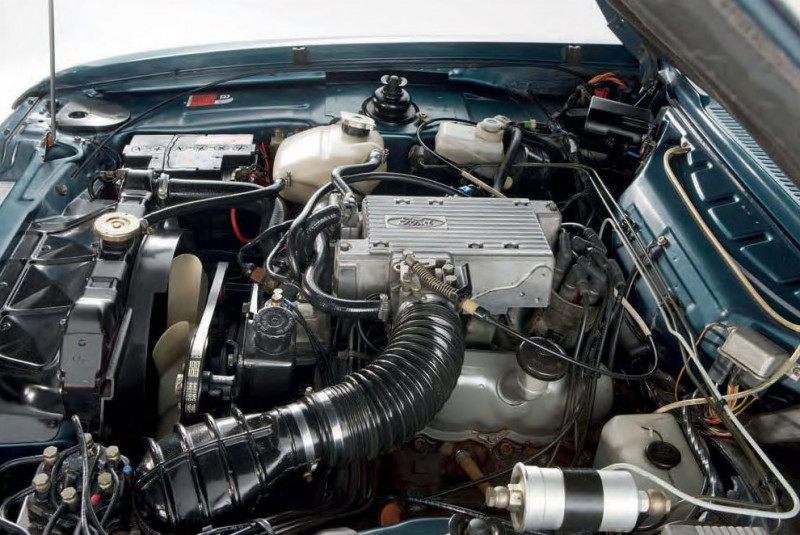
ONE TO BUY
- Price: £39,995
- On sale at: classified advert on internet auction site
- For: Original panels, low number of owners
- Against: Not the cheapest
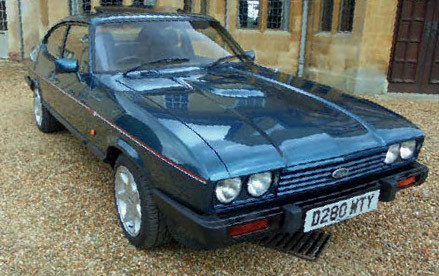
This March 1987-registered 280 has had only two owners, with little more than 60,000 miles on the clock. Recently recommissioned and resprayed after a significant time in storage, the Capri has had no structural welding. The front panel has been replaced with a genuine Ford part, but all other panels are original, the underside having been saved due to the previous owner liberally applying old engine oil and Waxoyl every year. It comes with service history, the factory service pack, two keys and the original numberplates and window sticker of the supplying dealer.
“THE 280 OBVIOUSLY HIT THE MARK AS ORDERS CAME IN THICK AND FAST”
NEED TO KNOW
Specialists
- Burton Power 0208 518 9136 burtonpower.com
- Capri Gear 01507 343148 caprigear.co.uk
- Ex-Pressed Steel Panels 01535 632721 steelpanels.co.uk
- Magnum Classic Ford Panels 01706 359666 magnumclassic fordpanels.co.uk
- Motomobil GmbH +49 8106 996 77 60 motomobil.com
- SM Classic Cars 07927 577356 sm-classiccars.com
- Steadspeed Restorations 07766 676379 facebook.com/Steadspeed
- Tickover 01322 839303 tickover.co.uk
Clubs & Forums
- Capri 280 Group capri280.co.uk
- Capri Club International 01386 860860 capriclub.co.uk
- Capri Power capripower.co.uk
- Capri World Search ‘capri world’ on Facebook
VALUES
- £20,000-£25,000 Roadworthy examples
- £25,000-£35,000 Tidy to good 280s
- £35,000-£45,000+ Exceptionally good to excellent cars
TECH SPEC
- Body Two-door, four-seater coupé, pressed steel monocoque
- Engine 2792cc, six cylinders, in 60 degree vee, two valves per cylinder, single camshaft, pushrods and rockers, Bosch K-Jetronic fuel injection.
- Max Power: 160 bhp @ 5700 rpm
- Max Torque: 162 lbf.ft @ 4300 rpm
- Gearbox Five-speed manual, all-synchromesh, limited-slip differential
- Suspension Front: independent by MacPherson struts, lower track control arms, coil springs, telescopic dampers and anti-roll bar. Rear: live beam axle with half-elliptic leaf springs, anti-roll bar and telescopic dampers
- Steering Rack-and-pinion, power assisted, 3.3 turns lock-to-lock
- Brakes Girling hydraulic with vacuum servo assistance. Front: 257 mm ventilated discs. Rear: 229 mm drums
- Wheels and tyres 7x15 inch cast alloy wheels, Pirelli P7F radial ply tyres 195/50R15
- Performance Max speed: 130 mph
- Acceleration 0-60 mph: 7.8 seconds
- Price when launched £11,999

